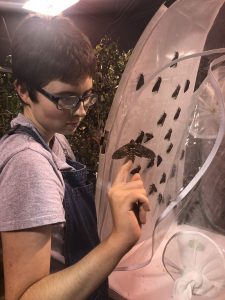Kellogg Biological Station (KBS) 2018 undergraduate summer researcher, Beth Ann Hansen, is a biology major at Grinnell College. They wrote about their KBS Research Experiences for Undergraduates (REU) project working with the Wetzel Lab.
I have spent eleven weeks over the summer thinking about how tomato plant neighbors and defense traits influence where tobacco hornworm moths (Manduca sexta) choose to lay their eggs. Eleven weeks is more than enough time to lose interest in a project and never want to look at a tomato again, but instead I am left with many more questions I wish I had time to answer. This summer has confirmed that I want to continue studying plant-insect interactions, and I would love to do more research on plant defense and herbivory specifically.

Beth Ann examining one of many tobacco hornworm moths in the mating chamber
Beyond this field, I also reaffirmed that I want to continue with research and with longer projects in the future. I had some experience both with class research projects and on-campus research last summer and always felt like the projects were too short. This summer was no exception, and I also took more ownership of the project as the summer progressed. Because I started the summer with negligible knowledge of the study system and the literature, my mentor Dr. Andrea Glassmire played a large role in experimental design. However, as I collected multiple rounds of data, I was able to schedule my tasks for the week and complete them with minimal guidance. Feeling in control of this project has given me confidence in my ability to lead a research project of my own design and continue research with a Ph.D.

A female tobacco hornworm moth sipping lemon-lime Gatorade
This summer was my first time as a member of a lab, so I learned how to work in that new environment. I enjoyed learning about other projects in the lab through helping people plant seeds, transplant seedlings, and collect plant fitness data. When I had very labor-intensive days that required digging trenches around 20 cage frames, each two meters by two meters, I was particularly grateful that the Wetzel Lab was so collaborative. What would have taken me several days of exhausting work was instead done with around eight people in only one day. Some of those helpers were the friends I made at the W.K. Kellogg Biological Station (KBS). Even though their research was entirely unrelated to mine, they came at 7 in the morning, and later in the summer helped me release moths into the cages. A few weeks before, we all worked together to set up the experiment of one of my friends’. A break from my own project, to learn about microbiology, was a welcome change.

Beautiful eggs laid on a tomato leaf by a hornworm moth
Friends I made at KBS are important to me not only for the practical help they offered, but for how close to each other we became. I arrived at KBS expecting to be lonely, isolated, and misgendered daily; instead, I found myself surrounded by lovely people who easily switched to using my correct pronouns and listened to me rant about social expectations. In turn, I listened to them talk about the long process of becoming a U.S. citizen, being a first-generation student, and their own set of social expectations. Many programs promise students that they will leave with life-long friends, and I never have. However, I grew closer to these people faster than I ever have, and I’m already looking forward to our Skype conversations next year.

A legacy of conservation; a commitment to sustainability.
3700 E. Gull Lake Drive
Hickory Corners, MI 49060
(269) 671-5117
info@kbs.msu.edu